THESE IMAGES ARE NOT POSTCARDS.
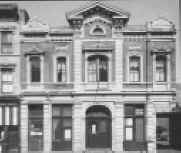
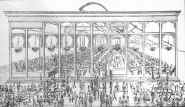
Wielerts Cafe 1408-1410 Vine
St
Interior sketch

Opened in 1873 Wielert's became
the finest local saloon of the day. Opened by Heinrich (Henry) Wielert (1826-1892), a
native of Hanover, Germany, who fought in the Civil War as a Union Soldier.
In the rear of the saloon was a block long
beer garden that had a roof but was open on the sides. This was the largest beer
garden in Cincinnati. Busts of German composers
and writers lined the perimeter.
On summer evenings, Michael Brand conducted his forty piece orchestra to entertain the patrons in the beer garden. Brand's orchestra became the nucleus of the Cincinnati Symphony Orchestra. The image below is the earliest known photo of the Symphony showing Brand leading the orchestra during the 1894-95 season. He became assistant conductor under Frank Van der Stucken.
Turner Hall was on the Walnut St. side of the
garden. (see Turner page).
If a customer did not order something else,
the waiter would bring Wiener Schnitzel, fried potatoes, rye bread, and of
course, beer.
Henry Farny was a frequent visitor to Wielert's and sketched the beer garden during his visits. In the center image above he shows Cox with some of his lieutenants. Thanks to Joe Retford for supplying the image above, he has a copy of this lithograph.
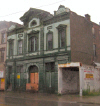

2 more recent images of the Wielert building
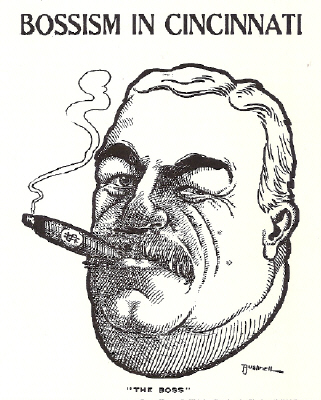
Not expandable
The political leader of Cincinnati from 1891 to 1916 George "Boss" Cox (1853-1916) met with his lieutenants at his personal table at Wielert's in order to plot his strategy. They met everyday at 5 P.M. One of his associates was August "Garry" Herrmann who while holding various political offices, was head of the Cincinnati Waterworks and was also president of the Cincinnati Reds from 1902 to 1927. He was baseball's first commissioner in 1905 and has been called the "father of the World Series". Another of Cox's lieutenants was Rudolph Hynicka (1858-1927), a Pennsylvania German. He arrived in Cincinnati in 1881 and worked as a newspaper reporter before entering politics. He was police clerk, chief clerk, Hamilton County treasurer, and chairman of the Hamilton County Republican party. He amassed a small fortune as a theater tycoon (he controlled a chain of 40 burlesque and legitimate theater companies) and moved to New York City.
Statement by George B. Cox to the Cincinnati Post June 23, 1905.
I am the Boss of Cincinnati. I never dodged that statement in my life. I've got the best system of government in this country. If I didn't think my system was the best I would consider that I was a failure in life.
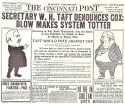
Oct. 1905 Post headline
Taft is anti Cox.
George Barnsdale Cox was the political
superpower of Cincinnati for over a quarter of a century. From 1886 to 1916 he
ruled Cincinnati. He was the man who made all the vital decisions and was
"head and front" of her political machine. His name was a household
word, known to adults and children alike. Because he was a principle kingmaker
for the state republican party, his reputation extended to all corners of Ohio.
The following information is from a Cincinnati
Enquirer article written by Cox himself on May 15, 1911. He wrote this because
he was under indictment for perjury in February, 1911 by the Hamilton County
Prosecuting Attorney, Henry Hunt. Hunt's election as mayor of Cincinnati in 1911
marked the beginning of Cox's downfall. In the article Cox related his rise to
power and the reasons for his political success. It was designed to win over
public support and, hopefully, to influence the Grand Jury. Since Cox rarely
wrote anything down (proof) during his political life and almost always passed
instructions to his lieutenants verbally, any written word of his life is almost
non-existent. He states in his article that he never made a dollar out of
politics. That no one had ever proved during his 27 years in power any
dishonesty (sound familiar?)
He stated that the millions of dollars he made were principally
from real estate and investments. In 1910 Cox was the owner of the
largest motion picture chain in the world, the World Film Corporation, he owned
half of the Shubert Theatrical Company, he was President of the Cincinnati Trust
Company, the 2nd largest in Cincinnati, and he owned part of the B. F. Keith
theaters in Cincinnati, Louisville and other cities. He was also part owner of
the Cincinnati Reds starting in 1902.
His stated that his daily life usually started at 7:30 when he left
his home in Clifton at the corner of Jefferson and Brookline Avenues arriving at
his office at the Cincinnati Trust Company at 9:00, and with the exception of an
hour or so at noon, was there until 5 o'clock. He states that he is accessible
to every one except bores and pests. He ate dinner at one of the hotels or clubs
with his business or political associates (usually Wielert's) and arrived home
about 8 o'clock in the evening. "I get my pleasure in my home life, for,
while I have no children, I have a loving and devoted wife. Although I have
large theatrical interests I rarely go to the theater. When I do go I attend
matinees so as not to waste an evening."
The first photo below is the building he lived in before moving
into the residence in Clifton seen in the next two images.



115 W. 9th
St.
G. B. Cox's Residence
Not a postcard
(postcard)
"Next to my home life I get the greatest
pleasure out of politics. After all, politics is a game. I like it because I am
successful. One usually likes to play the game in which one is successful. It's
human nature."
"Naturally, my success as a boss has brought all manner of
attacks on me. I have been assailed from every quarter, and on every pretext. I
am attacked for two reasons: First, because most people suppose a boss is
dishonest; and second, because I have been so successful. I believe the
bitterest attacks that have been made on me have emanated from the disappointed
office seekers - men within the ranks of the republican party who have been
turned down by me because of their unfitness."
He states further on that "I will clear myself of the charge
at the proper time. I am hardened to attacks by the press. I am living my life
as I believe I should live it. My enemies cannot affect me."
He strenuously advises young men not to enter politics. "In
the first place there is no money in it for the honest man, and in the second
place there is only abuse, whether you are successful or unsuccessful. In fact,
the more successful you are the more abuse will be heaped on you. Politics as a
profession doesn't pay."
"As I said before, this boss-ship was not of my seeking.
It was the result of the natural evolution of things. However, it has become
such a part of my life, I have grown into it to such an extent that I cannot
voluntarily give it up. I am 58 years old-far too young to retire. I am going to
continue as the leader of the Republican Party in Cincinnati as long as the
Republican Party wants me."
"This is the age of the boss. No one must lose sight of this
fact for a second."
The indictment was quashed 3 months later. The Enquirer stated on
November 5, 1911: The judges discharged the "Old Boy" without a trial
on a 'frivolous technicality making the administration of justice in this
country a hissing and a reproach."
Cox's
political machine ended with the elimination of ward politics and the rise of
the Charter Party.
Wielerts closed in 1919 and became the
Gildehaus Funeral Home.
As a young man (24) George Cox owned a saloon
at Central Avenue and Longworth Street popularly known as "Deadman's
Corner" because of the numerous murders committed there; most remained
unsolved. Cox was a Republican and since the city was under Democratic
control, his saloon was under continuous police harassment. For this reason Cox
decided in 1879 to run for City Council, thus hoping to become immune to future
harassment. Thus began his political career. He sold this saloon in 1881.
Next door to the Gibson Hotel on Walnut St. was the
Mecca Saloon (see 4-part card on previous page) for 25 years Cox maintained his
office above this saloon.